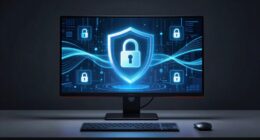In cybersecurity, both programming and ethical hacking are essential skills. Programming enhances system understanding, aids in exploit development, and automates tasks. Ethical hacking provides tools for vulnerability testing, penetration testing, and custom tool development. While programming offers deep insight into system vulnerabilities and architecture, ethical hacking equips individuals with hands-on tools to test and secure systems effectively. The combination of these skills is powerful in the cybersecurity field, offering a holistic approach to defending against cyber threats. Understanding the benefits of each skill will pave the way for a well-rounded cybersecurity professional.
Key Takeaways
- Ethical hacking enhances cybersecurity defense strategies.
- Programming enables exploit development and custom tool creation.
- Understanding programming languages aids in vulnerability identification.
- Ethical hacking skills crucial for penetration testing and threat prevention.
- Proficiency in programming provides a competitive edge in cybersecurity.
Importance of Programming in Cybersecurity
Programming plays an essential role in the field of cybersecurity by enabling professionals to develop robust security measures, analyze vulnerabilities, and safeguard sensitive information effectively.
In the context of penetration testing, programming skills are invaluable for identifying system weaknesses, evaluating security measures, and proactively mitigating threats.
Understanding various programming languages allows cybersecurity experts to craft exploits, create custom tools tailored for penetration testing purposes, and automate security tasks efficiently.
Moreover, coding expertise enhances defense mechanisms against cyber attacks by enabling the implementation of sophisticated security protocols.
In the event of a security breach, individuals with strong programming knowledge can mount an immediate response, preserve evidence for forensic analysis, and deploy preventive security measures swiftly.
Key Benefits of Ethical Hacking Skills

Developing ethical hacking skills not only opens doors to a lucrative career path, with cybersecurity professionals earning a median salary of $100,000 USD annually, but also equips individuals with the ability to anticipate and prevent security threats.
In a rapidly evolving digital landscape, mastering ethical hacking can provide a competitive edge by boosting problem-solving skills and fostering independence among programmers.
With the cybersecurity job market expected to grow substantially by 2028, honing ethical hacking skills can offer a rewarding and engaging avenue for those looking to excel in the field.
Job Market Demand
The increasing demand for cybersecurity professionals with ethical hacking skills underscores the essential need for individuals proficient in protecting digital systems from cyber threats. As the field of cyber security continues to expand, ethical hackers play a vital role in identifying vulnerabilities within systems before malicious actors can exploit them. With the cybersecurity job market expected to grow by 32% by 2028, the need for skilled ethical hackers is more prominent than ever.
The median pay for cybersecurity professionals, including ethical hackers, is approximately $100,000 USD per year, highlighting the lucrative nature of the industry. Despite this attractive salary range, there remains a significant shortage of skilled cybersecurity experts, resulting in numerous unfilled positions across various sectors.
Companies are increasingly prioritizing cybersecurity measures due to the rise of cyber threats, creating a favorable job market for individuals with ethical hacking skills to secure systems and prevent data breaches.
Cybersecurity Skills Boost
Improving one's cybersecurity expertise through the acquisition of ethical hacking skills can greatly strengthen an individual's ability to protect digital systems against potential cyber threats. Ethical hacking skills play an important role in enhancing cybersecurity knowledge and preparedness. By learning ethical hacking, individuals can effectively identify and address security vulnerabilities that could be exploited by malicious actors.
The high demand for ethical hacking skills in the cybersecurity industry underscores their significance in safeguarding sensitive information and preventing cyber attacks.
Understanding ethical hacking enables individuals to proactively protect systems from potential threats by gaining valuable insights into security risks and learning how to mitigate them effectively. This proactive approach to cybersecurity is essential in today's digital landscape where cyber threats continue to evolve in complexity. Therefore, acquiring ethical hacking skills not only enriches one's cybersecurity skill set but also equips them with the necessary tools to defend against ever-evolving cyber threats.
Automation in Ethical Hacking

Automation plays a pivotal role in the domain of ethical hacking by enabling the creation of tools that streamline tasks and boost efficiency.
By developing scripts tailored to specific hacking objectives, practitioners can effectively manage multiple targets while maintaining precision in their operations.
The careful definition of input and output data formats is crucial to guarantee the seamless integration of automation into ethical hacking practices.
Automation Tools in Hacking
Efficiency in security assessments is greatly enhanced through the utilization of automation tools in hacking, streamlining repetitive tasks effectively. These tools enable ethical hackers to automate various steps in the hacking process, freeing up time to focus on developing custom tools for penetration testing. It is essential to have programming knowledge to define input/output data formats and storage, ensuring the seamless deployment of automation tools in hacking. By leveraging automation, ethical hackers can scale their operations to handle multiple targets simultaneously, thereby optimizing the entire ethical hacking process. This not only saves time but also allows for more thorough and complete security assessments. Below is a table showcasing some popular automation tools used in hacking:
| Automation Tool | Description | Benefits |
|---|---|---|
| Metasploit | Penetration testing tool | Exploitation and post-exploitation |
| Burp Suite | Web application security testing tool | Automated scanning |
| Nmap | Network discovery and security auditing tool | Port scanning and service detection |
Efficiency in Hacking
By harnessing the power of automation tools, ethical hackers can greatly enhance the effectiveness of their hacking endeavors, ensuring streamlined and efficient security assessments. Automation in ethical hacking allows for the efficient execution of repetitive tasks, saving time and increasing productivity.
Ethical hackers can leverage their programming skills to automate various hacking steps, thereby enhancing their capabilities in penetration tests. Important considerations when deploying automation in hacking tasks include defining input data format, output data format, and storage parameters.
Automating hacking processes not only saves time but also enables scalability for handling multiple targets effectively and consistently. Utilizing automation in ethical hacking can streamline the identification and exploitation of vulnerabilities, leading to more thorough security assessments.
Crafting Exploits With Programming

Crafting exploits through programming is an essential skill for ethical hackers to effectively demonstrate system vulnerabilities. When diving into the world of ethical hacking, mastering the art of creating exploits with programming is vital for uncovering security flaws in various systems.
Here are three key points illustrating the importance of this skill:
- Tailored Exploits: Crafting exploits with programming allows hackers to develop tailored tools that can pinpoint specific vulnerabilities within a system, enabling them to create targeted attacks that simulate real-world threats effectively.
- Custom Tools: Knowledge of programming languages empowers ethical hackers to create custom tools for penetration testing. These tools can automate tasks, streamline processes, and enhance the overall efficiency of security assessments.
- Effective Exploitation: Understanding software vulnerabilities through coding not only helps hackers identify weaknesses but also aids in creating exploits that can exploit these vulnerabilities efficiently, thereby demonstrating the critical need for programming skills in ethical hacking endeavors.
Custom Tool Development for Hacking

Developing custom tools for hacking provides ethical hackers with the ability to tailor solutions to specific security challenges, enhancing their penetration testing capabilities. By creating tools customized to their needs, ethical hackers can gain greater control and understanding of the hacking process.
These custom tools enable hackers to fill gaps in existing tooling, improving efficiency and effectiveness in identifying vulnerabilities. Testing these tools against both local environments and real targets confirms their adaptability and reliability in diverse scenarios.
Ethical hackers often rely on custom tools to augment their penetration testing arsenal, allowing them to approach security assessments with a more targeted and nuanced perspective. The process of developing custom tools not only strengthens hackers' technical skills but also fosters creativity and problem-solving abilities.
Versatility of Programming in Security

Programming skills are essential in cybersecurity, providing professionals with the versatility to develop secure applications, analyze vulnerabilities, and create custom security tools.
When it comes to the versatility of programming in security, the following points highlight its significance:
- Identification and Exploitation of Weaknesses: Understanding programming languages such as Python, C/C++, and Java is vital for ethical hackers to identify and exploit security weaknesses effectively. By being proficient in these languages, cybersecurity experts can uncover vulnerabilities and develop appropriate defense mechanisms.
- Automation and Penetration Testing: Programmers adept in scripting languages can automate security tasks, conduct penetration testing, and enhance incident response capabilities. This automation not only saves time but also ensures a more thorough examination of systems for potential vulnerabilities.
- Customization of Security Solutions: Strong programming foundations empower individuals to secure systems, detect malicious activities, and implement robust security protocols. By customizing security solutions through coding, cybersecurity professionals can adapt to evolving cyber threats and protect against sophisticated attacks effectively.
Enhancing Efficiency Through Coding

How can coding skills greatly enhance the efficiency of ethical hackers in their security tasks?
Coding skills play a pivotal role in boosting the effectiveness of ethical hackers by enabling them to automate repetitive tasks. By writing scripts and programs, hackers can streamline their workflow, saving time and increasing productivity.
Additionally, understanding programming is vital for exploit development, allowing hackers to create tailored exploits to demonstrate vulnerabilities effectively. Ethical hackers can leverage their coding knowledge to develop custom tools for penetration testing, providing them with a competitive edge in identifying and addressing security gaps.
Furthermore, proficiency in programming empowers hackers to comprehend complex software vulnerabilities deeply and design robust defense mechanisms to safeguard sensitive information effectively. Ultimately, strong coding skills are essential for enhancing efficiency in security tasks, enabling ethical hackers to stay ahead of cyber threats and protect systems proactively.
Deepening System Understanding With Programming

By delving into programming, individuals can greatly enhance their comprehension of system architectures and operations. Understanding how programming languages interact with system components is key to gaining a deeper understanding of how software functions within a system.
Here are three ways programming aids in deepening system understanding:
- Creating, Analyzing, and Modifying Code: Through programming, developers can actively engage with code, dissecting it to understand how different components work together to form a cohesive system.
- Identifying Vulnerabilities: Proficiency in programming languages allows individuals to spot weaknesses in software systems, enabling them to strengthen security measures and address potential risks effectively.
- Reverse Engineering Processes: Programming skills are essential for reverse engineering complex systems, helping individuals uncover security flaws and develop strategies to mitigate them effectively.
Frequently Asked Questions
Should I Learn Ethical Hacking or Programming?
When considering whether to learn ethical hacking or programming, it is essential to evaluate your career goals and interests. Understanding the fundamental aspects of both fields can provide a well-rounded skill set for a successful cybersecurity career.
Which Is Better Ethical Hacking or Software Development?
When evaluating ethical hacking and software development, it's important to contemplate your career goals. Ethical hacking offers insights into cybersecurity threats, while software development focuses on creating applications. Both skills have their advantages depending on your interests and objectives.
Who Earns More Ethical Hacker or Programmer?
Ethical hackers often earn higher salaries than programmers due to their specialized skills and high demand in the cybersecurity industry. With advanced expertise, ethical hackers can command competitive pay exceeding that of many programmers.
Is Hacking Harder Than Programming?
Analyzing whether hacking is harder than programming involves considering the unique challenges each field presents. Hacking demands creativity to bypass security measures, while programming focuses on building functional solutions. Both require distinct skill sets.
Conclusion
To summarize, both programming and ethical hacking skills are essential in the field of cybersecurity. While programming allows for the development of custom tools and enhances efficiency, ethical hacking skills enable the identification and exploitation of vulnerabilities.
According to a recent study by Cybersecurity Ventures, the demand for cybersecurity professionals is expected to rise to 3.5 million unfilled positions by 2021, underscoring the importance of acquiring these valuable skills for a successful career in the industry.









